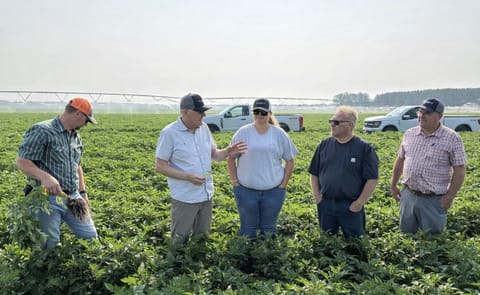Potato Beetles on display at the Fredericton Research and Development Centre's open house
Primaire tabs
Fredericton Potato Research Lab invites the public

More than 300 people stopped by Fredericton Research and Development Centre's open house.
Potato Variety Development
Benoit Bizimungu spends about 12 years working on a single type of potato, trying to develop a more resilient crop that requires less fertilizer or chemical.
The research scientist had a chance to share his work with the public Saturday when his workplace, the Fredericton Research and Development Centre, opened its laboratory doors to the public.
More than 300 people stopped by the open house to get a peek into the federal facility, which primarily focuses on researching potatoes.
"I think it's a way to connect with the people," said Bizimungu, who works with different potato strains, finding ways to develop new and improved varieties.
Each year, he begins his research in the field with 100,000 potato varieties. He said the volume of work he and his colleagues do surprised some and others were shocked to learn it can take 12 years to create a new potato.
"I tell them you have to be patient to truly develop some improved product," he said.
Kathryn Downe and her husband have lived in city for close to 20 years but had never been inside the federal complex before.
"I've always driven by and thought 'gee, that looks awfully interesting," she said.
'Small milestones'
The breakthroughs in the lab aren't always thunderous to the public. Research scientist Helen Tai said the open house is a way to make the research more accessible.
"There are small milestones but we get plenty of excitement out of it," said Tai, who primarily works in genetics.
She said the discoveries can apply to improving the potato industry and the nutritional quality of the tuber. It also means finding ways to protect crops against disease and damaging insects such as the Colorado beetle.
"They can defoliate a field in a matter of days," said Tai.
One of the ways to combat the beetle which can cause up to 50 per cent of a loss in crop yield, is by cross breeding varieties of potato.
Taste is relative for beetles, she said, so the researchers try to breed varieties the insects may not like. Some of those Tai said, can be found in wild strains of potato that domestic potatoes don't contain.
Labs growing
More discoveries in different fields could soon be on the way at the facility. In the last year, it and its sister labs in Charlottetown, added 10 new scientists.
Director of Research Eric van Bochove said the centres have added experts in landscape carbon research and plant pathology to help better understand soil health.
"It not only increases the number of people but also brings new science in," said Van Bochove. "Filling some of the gaps that we had."









